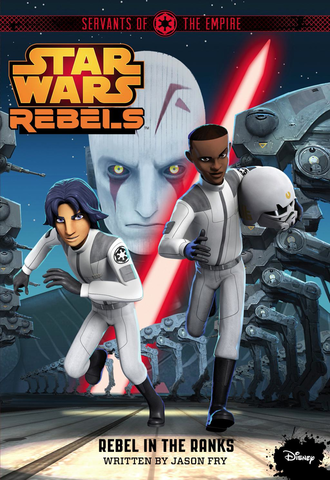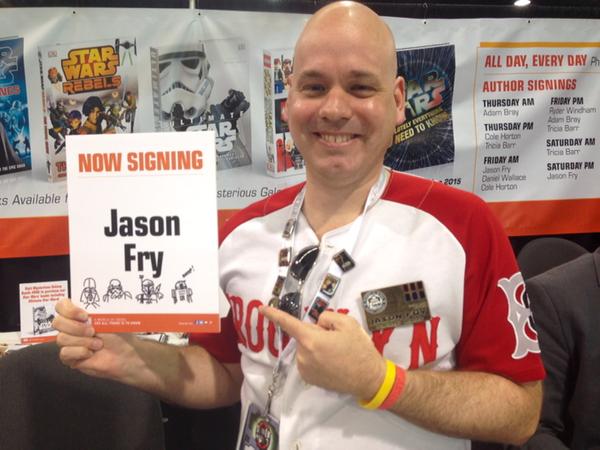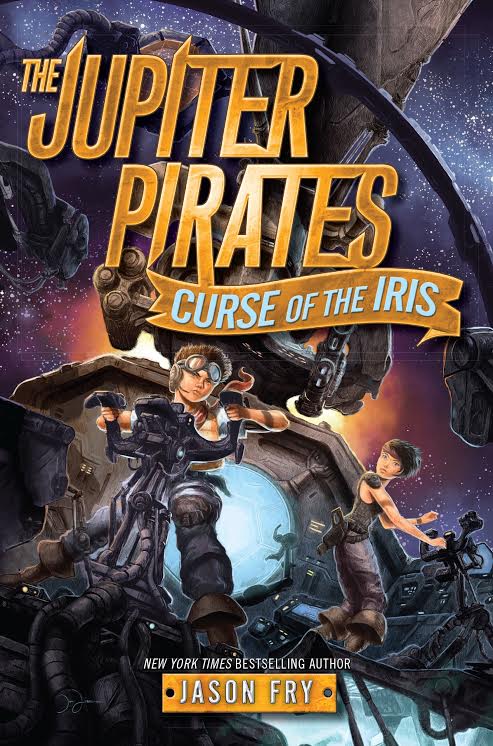 Continued from Part One, where we discussed the Rebels timeline and Zare Leonis’s speculated connections to The Force Awakens.
Continued from Part One, where we discussed the Rebels timeline and Zare Leonis’s speculated connections to The Force Awakens.
Speaking of The Force Awakens again, I was just at the panel for that yesterday morning, and Kathleen Kennedy made a comment about how the new Star Wars is gonna be more inclusive for the fandom…have more recognition for female fans, starting with the films. What do you think the chances of that being reflected in the new novels are? We have characters like Merei of course, and we have Sabine and Hera from Rebels. Is there gonna be time to have—and Merei had a joint point-of-view with Zare in your second novel—is there gonna be a chance to have a female-led Star Wars young adult novel, or adult novel in the future?
Um…there’s nothing in my work that addresses that, that I have in the works, but yeah. I think that’s definitely happening, and I think it’s gonna be wonderful when it happens, and I bet it would happen very soon. I don’t know any secrets, but like you, I can see that yes, as Kennedy said, Star Wars has made, I think, a huge jump in that realm. And it’s great, because one thing you see at a convention like this, you see talking to fans, is that Star Wars really does lead the way people think about things, and that’s wonderful.
The one thing I’ll say, as an author, that I think fans may have drawn a different conclusion about, is…we’ve seen a lot of storytelling, casts of characters, that are a lot more inclusive in recent books, projects, et cetera. But if there was a memo about that to creators, I didn’t get it. It, really, it’s not coming from the top down. I think it’s just been a sea change that’s just happened in Star Wars and everywhere else—where we’re just thinking differently about it, and portraying things a little more broadly so that more people are included. And I think that’s wonderful, but what’s really wonderful about it to me is it just kind of happened. I think it’s interesting that it’s changed, I think, so quickly all at once, but from what I know it’s been a completely organic process. And that’s even better.
And would you say that authors have a lot of choice in how to craft and create these characters? When you introduced Merei, did you decide to make her a point-of-view character? Was that something you had in mind all along, or did you do that in response to the fan reaction and reception of her in such a positive light?
I think as an author, you have to be really careful adjusting the story you tell based on reader reactions. I mean, reader reactions are gratifying when they’re good…when they’re not good they’ll teach you things, but I think you wind up ultimately shortchanging the storytelling if you let that kind of thing push you too much. The term ‘fan service’ does not often go that well with great storytelling.
Merei was an interesting case, as a character…for Servants, I really imagined her as a foil for Zare. I wanted to use her as a way to show that Zare was thinking differently about things, and to watch him evolve. She actually started as something very specific—Zare is the center striker on the AppSci grav-ball team, and I wanted to have a little fun with sports. Sports has been…is very much between the idea of kind of the will to win—and it’s chemistry, and desire, and all that that makes people win—versus, there’s also, sports has been really remade by people looking at stats and looking at strategies and finding ways to win that way. And originally Merei was this kind of stat geek—she was a slicer and she was a stat geek. She was not gonna be on the grav-ball team, but she was gonna use her knowledge of stats and her intuition to help Zare win. And there was another character who ultimately got cut from the book, who was gonna be kind of the will-to-win guy. So it was really kind of a…sports fan having fun with those things in sports. And Merei’s last name, Spanjaf, was actually a tip of the hat to friends of mine who are Sports Illustrated writers.
Oh, excellent.
Yeah, Emma Span and Jay Jaffe–it was kind of a wedding gift for them that they neither asked for nor know that they received, but the secret’s out. So that was the start of Merei, but that changed—and it was actually Greg Weisman, the Rebels producer, who said ‘why isn’t Merei on the team?’ Like—let the girl play, what the heck? And he was absolutely right about that. And we adjusted the book that way to write it differently, and I’m really grateful to Greg that we did, because it opened up more possibilities.
 And that was really the start of Merei becoming a much more interesting character and taking a much more direct role in the narrative—which wasn’t my original plan, but once I was writing the first book and really saw what she could do, and really just as an author started to fall in love with the character, then I just took it that way. And I think it turned out to be a really good decision. There are parts of the series where Zare is kind of stuck, in his goals in the academy and elsewhere, and this really let the narrative keep having some momentum and keep moving forward—with Merei leading things. As a writer, as a storyteller, you plan out a lot of stuff, but there are some happy accidents, too.
And that was really the start of Merei becoming a much more interesting character and taking a much more direct role in the narrative—which wasn’t my original plan, but once I was writing the first book and really saw what she could do, and really just as an author started to fall in love with the character, then I just took it that way. And I think it turned out to be a really good decision. There are parts of the series where Zare is kind of stuck, in his goals in the academy and elsewhere, and this really let the narrative keep having some momentum and keep moving forward—with Merei leading things. As a writer, as a storyteller, you plan out a lot of stuff, but there are some happy accidents, too.
And I definitely look forward to seeing more of her in the upcoming books. Last couple of questions—do you set out to make your books educational, because they’re Young Adult novels? I’ve referenced in my reviews that I find that your Rebels books create a lot of life lessons, I think, for young adults growing up in academia, or sports—having to deal with different kinds of people, authority figures, et cetera, while your Jupiter Pirates books have a lot of astronomy and solar system terms that have to be explained to the reader. Is that just a part of storytelling, or do you set out at the same time to educate your readers a bit too?
Really just the storytelling. When I come to something, whether it’s something in the real world, or something in an imaginary world we’ve built, I of course try to make it accurate, and deliver some facts that hopefully are interesting, but it really has to support the storytelling, not the other way around. I think it just works much better that way. For kids, I would say all that times about a thousand for the idea of themes—if you’re exploring, say, loyalty, responsibility, et cetera. Kids like being lectured and having fingers pointed at them and told big lessons just as much as the rest of us do, which is to say not at all. And in my experience, with my own son Joshua, when he was a little kid, watching what he would read, the books that absolutely didn’t connect were the ones that were really didactic—and you could tell were written just to get something across.
So that’s something that hopefully emerges from the storytelling. But one of the really great things I’ve learned about writing kids’ books is, if you have a good story that stuff generally emerges fairly naturally. I like to say that I write small books about big themes—they may be thirty thousand words long, or fifty to eighty in the case of Jupiter Pirates, but they go after stuff that we think about our whole lives, and struggle with. And I think it’s a mistake to think kids can’t handle that or think about it—of course they do. They think about it and struggle with it much sooner than we give them credit for. I think that’s one of the greatest things you can do for a kid as an author, just simply take them seriously.
And some kids’ books don’t. I don’t know about you, but when I read a book like that as a kid, I knew I was being talked down to, and it stopped working immediately. So I really hope that’s something I’ve never fallen into as a writer.
I always like to tell people that the Servants of the Empire series is worth sitting alongside the adult novels, and people shouldn’t look away from it just because it’s marketed towards, or they don’t think it applies to…the politics, coming of age, those themes aren’t just for young readers. I think they apply to the whole audience. And it’s good to know that they’re written that way, as well.
I will give a shout-out to Pablo Hidalgo, at Lucasfilm. Pablo, every time, in my treatments, when I’m talking about Imperial policy, or politics, et cetera, he’ll always invariably have the Pablo comment, which is, ‘we’re gonna do this briefly and it’s gonna be fun, right?’ Which he’s absolutely right about, and it’s a good reminder to keep me from going into Episode I crawl mode, and kind of losing the reader a little bit.
I don’t know, I’m sure there’s an audience out the for The Adventures of Ars Dangor—it may be an audience of one, but, you know…
Yeah, exactly.
And last question, thinking of Jupiter Pirates, what is your favorite part of writing in an original universe? Obviously tie-in work is a lot of fun, Star Wars is one of the greatest franchises there is, but what do you like about writing your own series?
The greatest thing about writing your own series is, it’s just completely yours. And I love Star Wars, I adore Star Wars, and I love the collaboration. But, by the nature of what it is, you kind of have lanes you can work in. And you’ve gotta kind of mind those boundaries. And boundaries can be very good for storytelling, but of course, it’s also—it can be very refreshing to have a completely blank slate. And to put whatever you want there.
 I will say, though, that with Jupiter Pirates, I’ve learned a tremendous lesson about Star Wars—and that is just how hard continuity is. Jupiter Pirates books have all sorts of continuity bloopers, from where readouts on Huff Hashoone’s chest are, to other things, and…I am so much kinder to continuity now that I’ve done it all myself than I used to be. And amazed at the stuff that Leland Chee and folks at Lucasfilm handle every day. I like to joke that I need another me for Jupiter Pirates who can be the ‘me’ for Star Wars—you know, keep it all straight. So be kind to your authors, and your continuity folk. It’s a lot harder than I thought it was.
I will say, though, that with Jupiter Pirates, I’ve learned a tremendous lesson about Star Wars—and that is just how hard continuity is. Jupiter Pirates books have all sorts of continuity bloopers, from where readouts on Huff Hashoone’s chest are, to other things, and…I am so much kinder to continuity now that I’ve done it all myself than I used to be. And amazed at the stuff that Leland Chee and folks at Lucasfilm handle every day. I like to joke that I need another me for Jupiter Pirates who can be the ‘me’ for Star Wars—you know, keep it all straight. So be kind to your authors, and your continuity folk. It’s a lot harder than I thought it was.
I suppose the fans seem to think it’s the easiest thing, saying ‘oh, they made this error and that error’—when you’re writing yourself, you might not have the advantage of being able to consult Wookieepedia and even if you do, it’s so easy to lose track of something that happens in the span of a single chapter, much less books in a large, shared franchise.
Yeah, the other part of it, I’d say, is—and I think I’ve said this before in interviews—is that to me, worldbuilding is like matte painting. You can get really lost in the worldbuilding, but it’s there to serve the story, and it’s like matte painting because I tend to construct what I need, just around the scene I’m doing. And sometimes, people are like, ‘wait, what’s in the sky? What’s in the mountain over there to the right?’ And when I get to the point where I need to figure that out to support the storytelling, sometimes you realize ‘oh, wow, I needed to do that background a little differently, because it’s taking me somewhere I didn’t expect’.
Maybe it’s not a mountain after all.
Yeah, exactly, exactly. So that’s been really…I’ve drawn some interesting lessons from there, working on Jupiter Pirates, that have fed into Star Wars. And vice versa.
Great. Well, it was great talking to you, and thank you for taking the time out to interview with us, and I hope to see you more around the con floor.
Thank you! Thanks for coming to see me.

“I don’t know, I’m sure there’s an audience out the for The Adventures of Ars Dangor—it may be an audience of one, but, you know…”
Smooth 🙂
Two! here!
Servants of the Empire 1 & 2 are to my mind the best of the canon books yet released (I’ve read them all, in the middle of LOTS now). I hope the day comes where Jason Fry gets to do a full length adult SW novel.